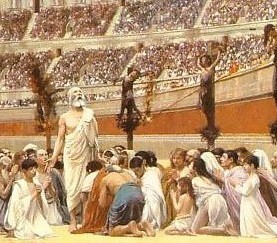
Politics among nations is radically different from politics within a democracy like the United States. The difference is almost like night and day due to one reason: anarchy.
In a democracy, we have a social structure designed to keep the peace. When we have disputes, we have a judicial system, and when the individuals of this judicial system make decisions, we have police officers to enforce the decisions. In some cases the police are called on to prevent individuals or groups from harming each other.
In a democracy, we respect the rule-of-law. We have a complex system of government that (more or less) responds to the needs of the people, and the people use this government to lobby for change. Things get done, and things get done peacefully. Our society has an economy based on competition, supply and demand. This economy mostly allows Americans to meet all their material needs and then some, without having to fight one another for these material things.
All these mechanisms in place in a democratic society, designed to promote peace and prosperity, simply do not exist on the international scene because there is no higher authority than national governments.
When nations have disputes there is no definitive international judicial system that can settle the fight. There is no international police force that can prevent states from resorting to violence. There is also no international government that can pass laws and address problems peacefully. Organizations such as the United Nations have no binding power, just look at the United States’ 2003 invasion of Iraq over the UN’s disapproval. “International Law” as we call it, is little more than commonly agreed upon codes-of-conduct that can be broken at any time. In fact, they are broken all the time. In short, the nations of the world are in a state of anarchy.
This is an indisputable fact. Accepting this truth is the beginning of understanding why international activities work as they do.





